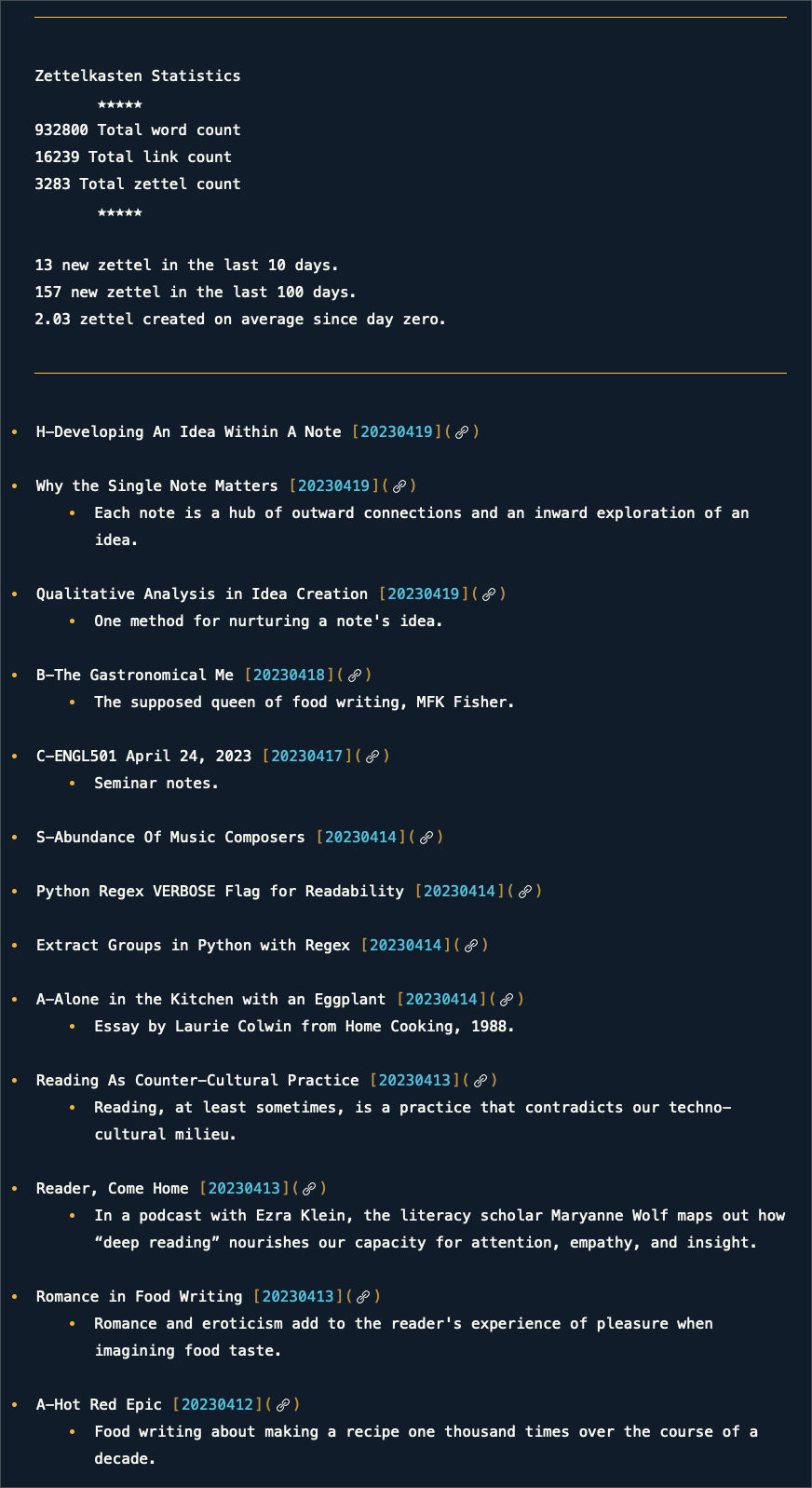Share with us what ideas you're grappling with this week. April 20, 2023
I'll go first again. But please take all this as an invitation to share your adventures and what you are reading. As you see, mine are boring, and you are probably doing more interesting stuff.
Typical of when I'm in class, my note-taking is slowed. More accurately, my refactoring of notes into atomic-sized notes has slowed. As many words are added to my ZK as usual, but each note is bigger. Because of the speed of the class, I don't feel I have time to refactor the notes I've captured from reading. "Read Hot Epic" is 800 words. I keep all the ideas captured from the story in a single note, hoping to atomize the note sometime. In the meantime, I have all the ideas, and because of my search skills, the ideas are not lost.
@Sascha's article Why the Single Note Matters is a real eye opener. I realize that I don't pay care and attention to each and every note. The effort and time commitment in this practice are what is called zettelkasting. The rewards are a supportive ZK partner. If you consider this a downside, the downside is that this activity siows time. You will naturally slow down. In a non-pressure environment, this is a good thing. Not so sure it works in a classroom setting with a schedule to keep up with.
I've started a list in my journal of projects to advance once I've completed the food writing seminar. That way, they can be off my mind and safely on a list. (Classic GTD principle)
I'm reading - Fisher, M. F. K.. The gastronomical me, Penguin Random House Publisher Services. 1989.
My ten-day zettel production

Will Simpson
My peak cognition is behind me. One day soon, I will read my last book, write my last note, eat my last meal, and kiss my sweetie for the last time.
My Internet Home — My Now Page
Howdy, Stranger!

Comments
I finished the last 2 (short and summary) chapters of Merlin Sheldrake: Entangled Life. Interesting and horrifying things learned about fungi. I don't have a "fungus" department in my ZK, yet, so whatever I take from this book will be new.
Currently still reading:
Zettel from last week: very technical
Author at Zettelkasten.de • https://christiantietze.de/
I'm reading "Models. Behaving. Badly." by Emanuel Derman. It's roughly about the strength & weaknesses of models in physics, moral philosophy, politics, finance etc. It was a recommendation from Nassim Taleb.
My goal from the reading is to sharpen my ability to recognise, analyse, create and apply models (other people's & my own) as well as recognising when something is platonic and not reality. He talks about how models led to the 2008 financial crisis and issues in classifying peoples' races during Apartheid South Africa. I'm currently reading about how Spinoza derived his theories on ethics.
The ideas touch on discussion from ZK forum around recognising models & theories in books (reading is searching), and issues drawing hard boundaries around concepts vs understanding the nature of concepts from articles like Don't Dehorisfy the Horse and Wittgenstein.
@ctietze do your § symbols in note titles denote structure notes?
Zettler
I'm wrapping up a multi-month leadership seminar through my church, and need to turn my attention soon to producing a final project out of my notes. Instead, though, I've been reading a book on theology, and have been told by our religious professional that I am a theologian, whether I've ever attended, or intend to attend, seminary or not. /twinkles/
Most of the notes I've taken this week have been long-form journaling, which still needs to be transcribed into digital format.
I was changing weak and identical passwords of websites when Google's security checkup reminded me of a lifetime subscription to 750words.com I acquired a decade ago. The website features an editing facility that presents the hapless writer with a new blank page daily and tracks whether they wrote the minimum 750 words that day.
Pitting yourself against others at the rate of 750 words per day is a formula for undistinguished misery. Reading an article questioning the wisdom of 'Write every day!' was a relief.† The article concerned academics' writing--notoriously beyond remediation, but it was helpful.‡
Most of what I have on that site should never have been written, much less see the light of day: it was embarrassing, self-indulgent drivel (even worse than my comments here). A few of the entries on 750words.com were worth adding to my ZK.
At least the Zettelkasten has been less embarrassing.
† Helen Sword (2016) 'Write every day!': a mantra dismantled, International Journal for Academic Development, 21:4, 312-322, DOI: 10.1080/1360144X.2016.1210153

‡ This ineptitude was recognized in classical antiquity.
GitHub. Erdős #2. Problems worthy of attack / prove their worth by hitting back. -- Piet Hein. Alter ego: Erel Dogg (not the first). CC BY-SA 4.0.